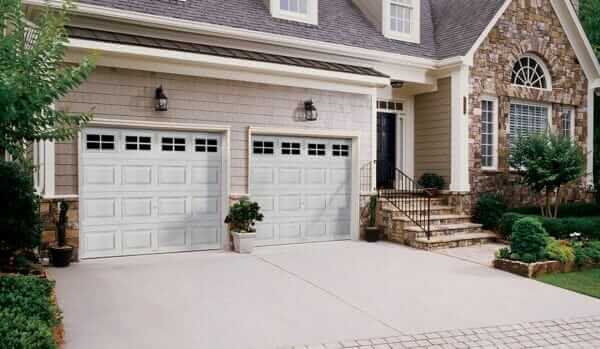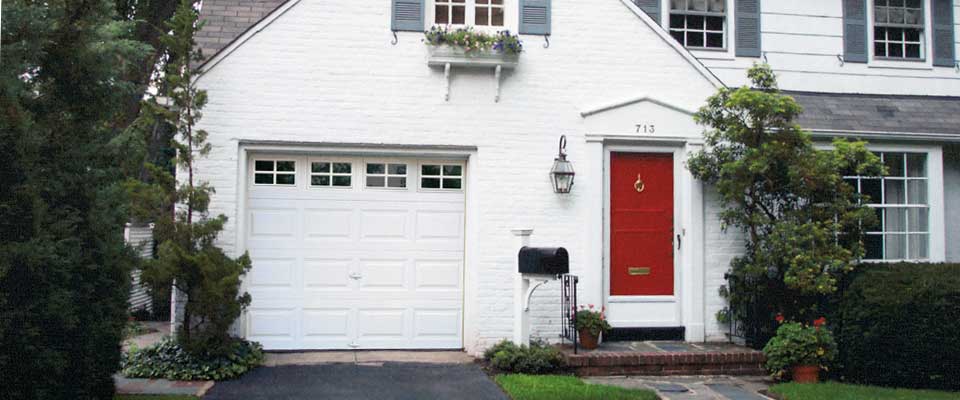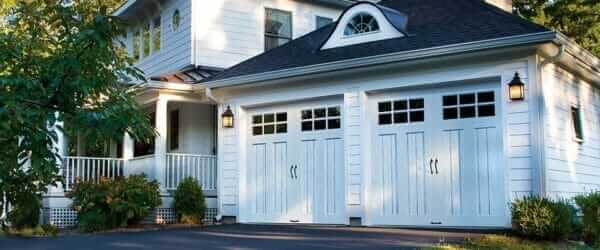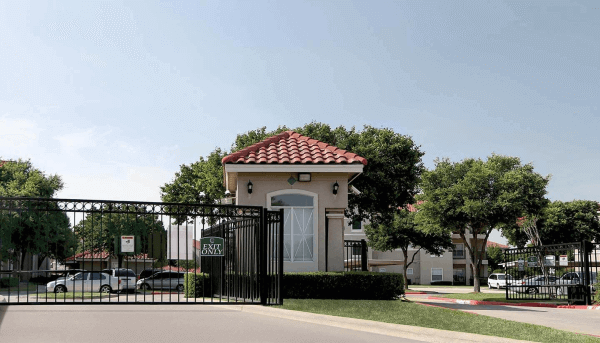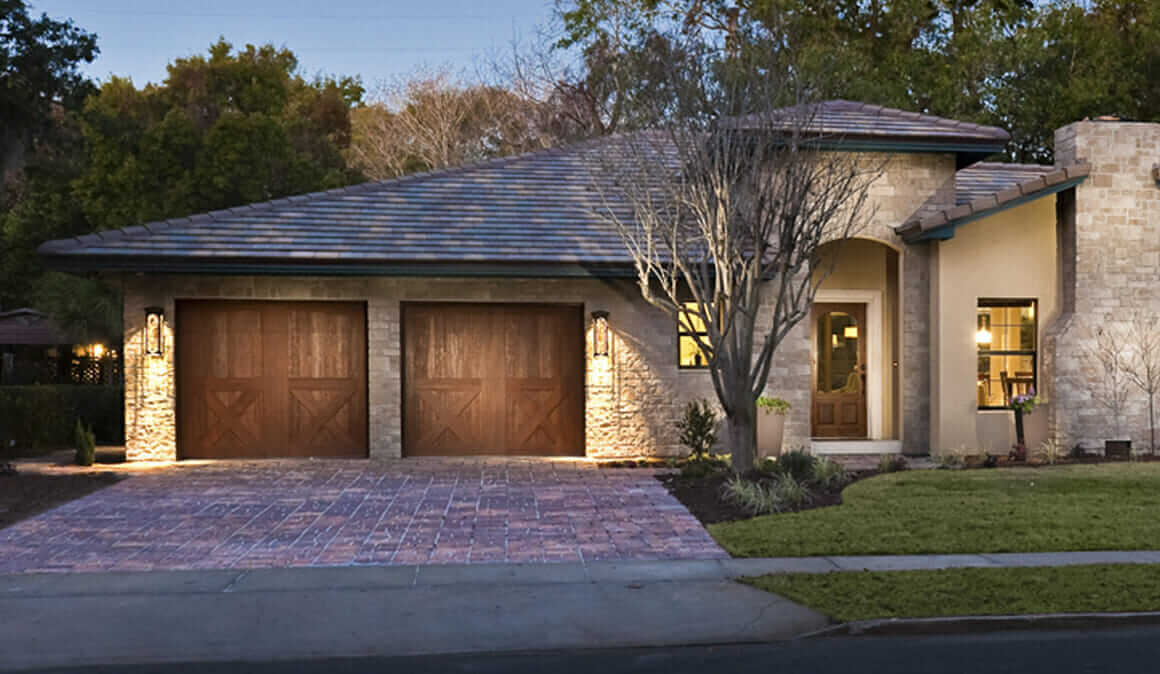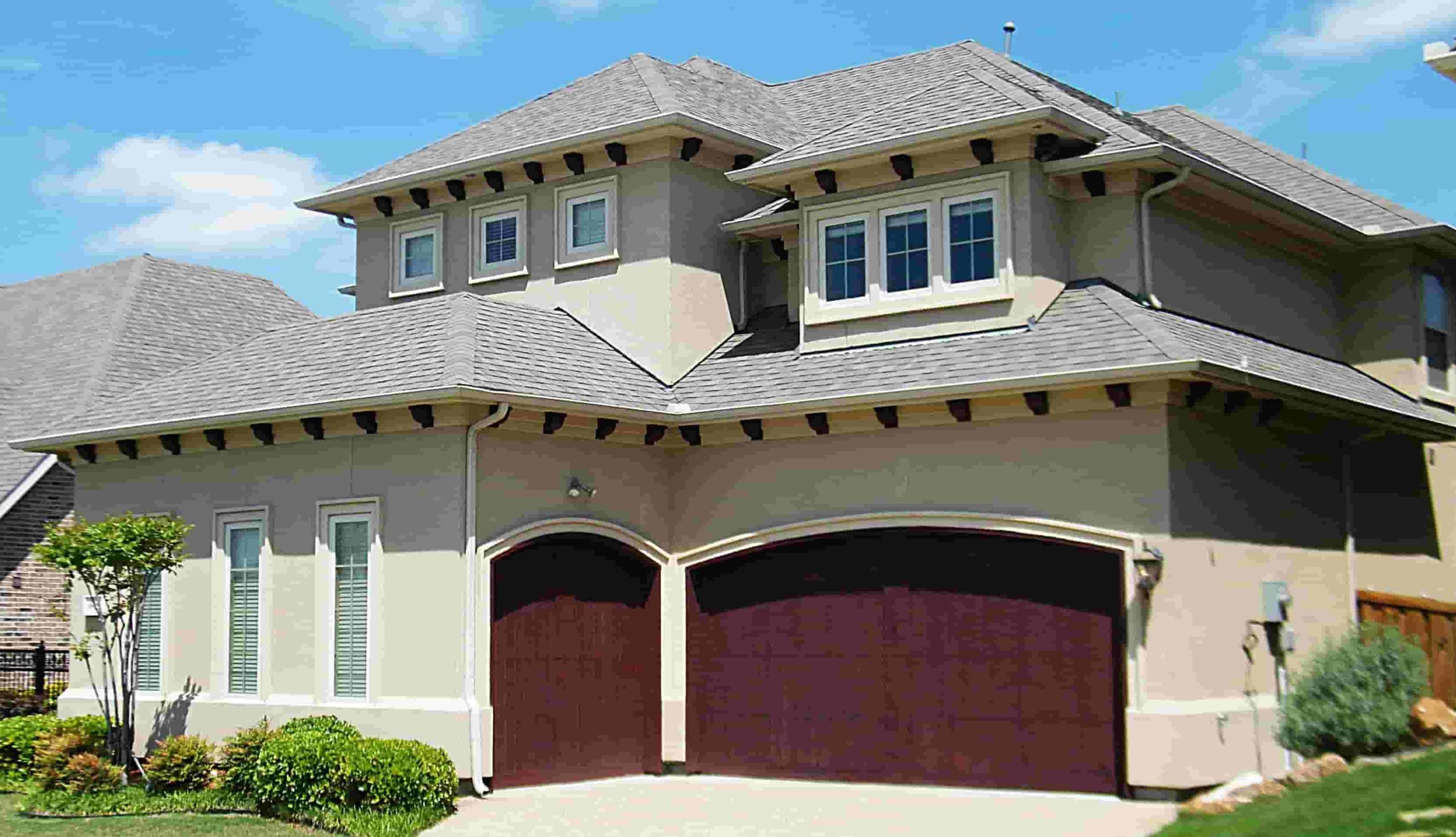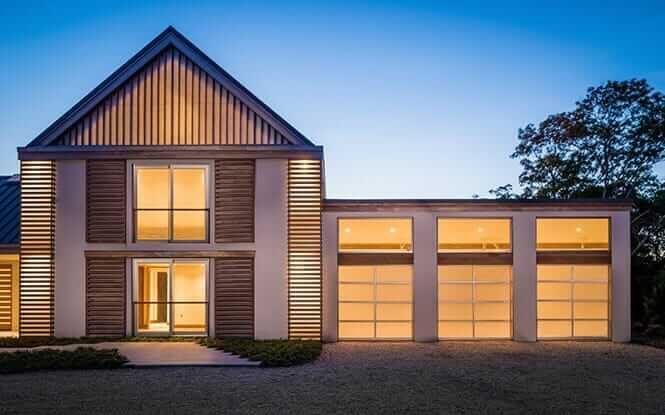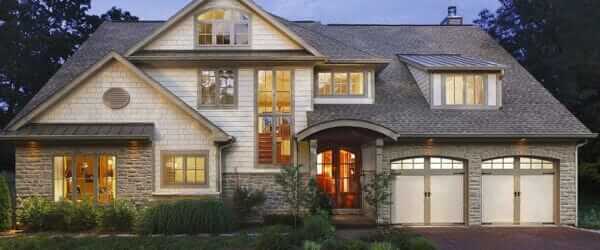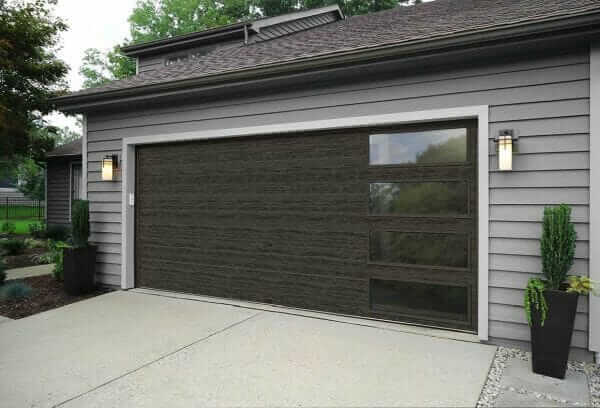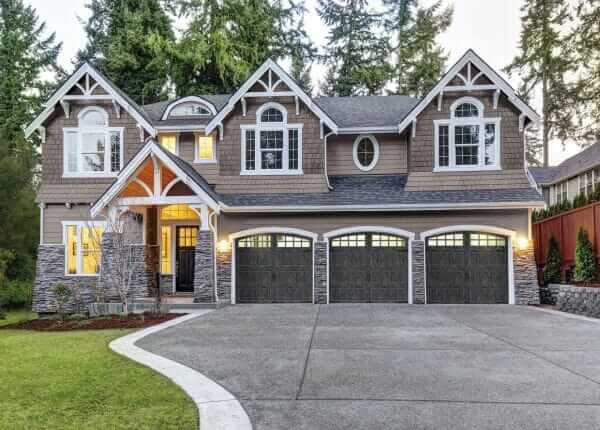Benefits of an Insulated Garage Door
With so many different types of garage doors, materials, styles and colors to choose from, you have a big decision when replacing your garage door. When shopping for a new garage door, it’s not just about the look. You have to consider the different features, too.
Insulation gives lots of great benefits to your garage door, but insulation does not come standard in every door out there. If you’re considering whether you need an insulated garage door, check out these three benefits you get from garage door insulation.
1. Temperature Control
With an insulated garage door, you can keep your garage at a steadier temperature. In the summer, the insulation will help keep the heat out. Similarly, during the winter months, the insulated garage door will help keep out the cold. The clear advantages are that your garage won’t feel swelteringly hot in the summer and freezing cold in the winter.
If you don’t have an insulated garage door, it can drive up your energy bills. The extreme temperatures in the garage can affect the rooms in your home that are around the garage, making you raise or lower your thermostat more than you usually would. Choose an insulated garage door to reduce your utility bill throughout the year.
Garage doors are much like windows in that you may find yourself constantly opening and closing them throughout the day. When the winter season approaches, you might refrain from using your garage as often due to the fear that cold gusts of air will quickly rush inside. Even when your garage door is not in use, you may experience frigid conditions inside without proper ventilation. An insulated garage door erases all your winter worries, providing you just the level of temperature control and coziness you and your family need.
Even when your house uses temperature control, your garage may be exempt from feeling the added warmth. Typically, many garages come constructed with concrete walls and floors that do little to benefit the homeowner regarding thermal properties. Insulated garage doors solve cold and frigid conditions by providing high R-Value thermal properties that retain warmth inside, guaranteeing less warm air escapes and more money stays in your pocket.
Insulated garage doors keep your garage feeling more pleasant, too. Whether you’re heading out or coming home, the garage will already act as a break in the weather outside, whether it’s the middle of summer or snowing outside.
2. Another Living Space
When your garage is more comfortable, you can turn it into a functional space. Instead of just using your garage to store your cars and other outdoor items, you can transform your garage into another living space.
Winter isn’t the only season that provides at times undesirable weather conditions. Sweltering summer days can emit unacceptably elevated levels of heat that quickly crank up the temperatures inside your home. Whether you want to remain toasty inside or fresh and cool, the right garage doors can help maintain the temperature you desire.
There’s no better way to escape frigid winter air or scalding summer days than by relaxing in a temperature-controlled environment. How comfortable can you be when you’re dripping sweat or freezing under layers of clothes –– inside your own home. You deserve to be comfortable in your home, and insulated garage doors offer you and your family relief and coziness every day of the year.
Work on your hobbies, watch TV, play video games or create a playroom for your kids. Without an insulated garage door, using your garage for an additional living space just isn’t possible.
Even if you don’t plan on using the garage for a living space, you can even just rely on it more for storage. With a more moderate temperature throughout the year, you can store items in the garage that might be affected by humidity and extreme temperature changes.
3. Noise Cancellation
You will be amazed at how much quieter an insulated garage door is. If you head out early in the morning or come back late at night, opening and closing the garage door can disturb other people in your home.
An insulated garage door also blocks out some noise from outdoors, making the living space in your garage more pleasant. However you want to spend your time in the garage, you won’t have as many distractions or disturbances coming from outside. This can be a great benefit if you live in a high traffic area.
4. Increase Your Garage’s Functionality
Your garage is more than a place to store your cars and bikes. Just like any other room in your home, your garage can serve multiple purposes. From a studio spacious enough to complete your tasks and hobbies to a home gym where you can pump some iron, garages can convert into practically any living space with ease. To make the conditions livable, you first need to ensure comfort, starting with the temperature inside.
Insulated garage doors provide consistent temperatures inside, even when the weather outside is unpredictable. Whether you’re turning on the A/C in the summer or cranking up the heat on colder days, you can rest assured your garage is suitable for lounging around in throughout the day.
As a homeowner, you have a lot of concerns about your residential garage door and how well it can protect your vehicles, secure access to your home, and prevent high heating and cooling bills. A residential garage door, or any entrance into your home, must be strong enough to insulate your home and keep it at a comfortable temperature.
You can judge how well your door will insulate your home by looking at its R-Value and other factors. R-Value is provided by manufacturers of residential garage doors, but it can be a tricky method of comparison. When it comes to R-Value, let’s look at the top questions and what you should understand when choosing your next garage door.
What Does R-Value Mean?
The R-Value of a residential garage door is a way to note the thermal efficiency of a door — a fancy way of saying how well the door insulates its enclosure. R-Value is often used as a way to show if a door is energy-efficient. The value is also based on the thickness of the insulation in your door as well as the chemical properties of the door’s materials. However, it’s not always easy to judge a door on its R-Value because there are differences between how doors are rated and what the values themselves represent.
Ask About What’s Advertised
While the majority of manufacturers will list an R-Value based on the overall thermal efficiency of the door, others have previously provided values based on a select part of the door. For example, calculating based on the center-most panel on a door usually bumps up the R-Value compared to calculations that average it across the entire door.
You might not get what you’re expecting if you get a door with an R-Value that only applies to the best panel. Always ask your door provider and installer to avoid using a door that isn’t what you want.
Ask About Your Residential Garage Door Service and Replacement
Your garage door is a statement. When you put the finishing touches on your door, ask if its R-Value may have changed along the way. Adding windows and glass to your door can reduce the R-Value because there is a gap in the insulation or thickness of your door. You can choose to use insulated glass or double-pane glass, but that may also increase your cost without giving you a big boost to R-Value.
As a homeowner, you have a lot of concerns about your residential garage door and how well it can protect your vehicles, secure access to your home, and prevent high heating and cooling bills. A residential garage door, or any entrance into your home, must be strong enough to insulate your home and keep it at a comfortable temperature.
You can judge how well your door will insulate your home by looking at its R-Value and other factors. R-Value is provided by manufacturers of residential garage doors, but it can be a tricky method of comparison. When it comes to R-Value, let’s look at the top questions and what you should understand when choosing your next garage door.
The R-Value of a residential garage door is a way to note the thermal efficiency of a door — a fancy way of saying how well the door insulates its enclosure. R-Value is often used as a way to show if a door is energy-efficient. The value is also based on the thickness of the insulation in your door as well as the chemical properties of the door’s materials. However, it’s not always easy to judge a door on its R-Value because there are differences between how doors are rated and what the values themselves represent.
While the majority of manufacturers will list an R-Value based on the overall thermal efficiency of the door, others have previously provided values based on a select part of the door. For example, calculating based on the center-most panel on a door usually bumps up the R-Value compared to calculations that average it across the entire door.
You might not get what you’re expecting if you get a door with an R-Value that only applies to the best panel. Always ask your door provider and installer to avoid using a door that isn’t what you want.
Your garage door is a statement. When you put the finishing touches on your door, ask if its R-Value may have changed along the way. Adding windows and glass to your door can reduce the R-Value because there is a gap in the insulation or thickness of your door. You can choose to use insulated glass or double-pane glass, but that may also increase your cost without giving you a big boost to R-Value.
If you’re shopping for a new garage door, be sure to choose Custom Door & Gate. We’ve got an unbeatable selection of top-quality garage door systems, giving you more options than anywhere else. Our team is ready to help you find the perfect door for your home and expertly install it. Contact us today to get started!
Contact Custom Door & Gate for an Insulated Garage Door Today
If you’re shopping for a new garage door, be sure to choose Custom Door & Gate. We’ve got an unbeatable selection of top-quality garage door systems, giving you more options than anywhere else. Our team is ready to help you find the perfect door for your home and expertly install it. Contact us today to get started!
What to Do When Your Garage Door Opens By Itself
The garage door is an essential part of your home but often underappreciated. It adds to your home’s curb appeal and gives you and your family an extra level of safety and convenience. Since we usually use our garage doors multiple times a day, it puts more stress on the door than we realize. We often only realize how important our garage doors are when they stop working correctly.
Garage doors are complex mechanisms. When any part of the device fails, no matter how small, it can affect the entire door. A ghost opening garage door is one problem that may indicate a problem with the mechanism.
Below are three reasons why your garage door opens on its own and some quick fixes you can try.
1. Radio Interference
Garage doors use radio frequencies to open and close. Whether you’re using the passcode entry, the buttons inside the garage, or your remote opener, the openers and the garage door itself must be on the same frequency.
Other devices also use the same frequencies. CB radios, police radios and even your neighbor’s garage doors may be on similar or the same frequencies.
Because two different garage doors can accidentally be programmed to the same channel, your neighbors may be causing your garage door to open on its own. When your neighbor uses their remote to open or close their door, it may cause yours to open, too!
If the frequency is the problem, you’re lucky — you have an easy fix. Just reprogram your garage door’s openers, and it should be back to working order.
2. Clear Out Debris
Electric garage doors make our everyday lives easier. From not getting wet in the rain to avoiding clearing our cars of snow and ice in the winter, they do a lot for us. Garage doors have many parts that all work together, including safety features.
These garage doors have sensors near the ground to ensure nothing gets stuck underneath the door when it closes. If the door goes up, seemingly on its own, after you close the door, be sure to check for any debris the sensor is picking up.
If anything is blocking the path, the door will not close. Be sure to double check if there is anything underneath the door if it continues to open back up after you close it.
3. Check the Remote Opener
Another easy way to fix a garage door that opens by itself is by checking the remote opener. If the remote opener is dirty or the batteries are failing, it may cause the door to open on its own.
The remote’s batteries may be breaking down or may just not be positioned properly. Double check their position or change them out to see if it prevents your garage door from opening on its own.
Count on Custom Door & Gate to Repair Your Garage Door
When your garage door begins acting up, it can cause a huge disruption in your day-to-day life. If your door opens up on its own and you can’t find the cause, it’s time to call in a professional.
At Custom Door & Gate, we’re ready to fix any issues with your garage door to get it working like it’s brand new again. Contact us today to schedule your service or repair!
Tips to Childproof a Garage
If you have children, you want to protect your little ones from accidents and injuries. The home can have plenty of risks that you wouldn’t even think about, so childproofing your house will significantly improve their safety.
One critical step in making a safer home for your family is childproofing a garage. Discover what you can do to keep your children safe from garage-related injuries.
Is My Garage Safe for My Children?
Most garages pose inherent risks to children, such as vehicles, concrete floors, and outdoor supplies. You want to keep your child away from these dangers as much as you can. Before you change anything in your garage, look at its current state. Evaluate your garage’s safety by asking yourself these questions:
- Can my children reach the chemicals and tools I keep in my garage?
- What about less obvious risks like garbage, pet food, and gardening materials?
- How often do I maintain my garage door?
- Do I keep my garage as clutter-free as possible?
- How easily can my child get into and out of my garage?
- Do I lock my vehicles whenever I’m not using them?
How Do You Childproof a Garage?
Now that you have an idea of where to start making your garage safer, you can take the steps to childproof it. Consider strategies like:
- Storing chemicals and other dangerous substances out of reach. Remember that some children will try to use stools and counters to reach these items. Put them up as high as possible or lock them in a cabinet. If you use a locked cabinet, keep the key far away from your children.
- Adding a Dutch door to your garage exit. Close the bottom half of the door and leave the top half open to let fresh air in or transfer groceries.
- Getting rid of clutter. Many of us use our garages to store tools and supplies, but these items often end up all over the garage space. Use storage to keep your clutter away from places where children can trip over them.
What Can I Do to Practice Garage Door Safety?
Automatic garage doors can cause injury if you don’t take the utmost care. If you have a garage door opener, keep it secure at all times. Many kids get excited to open and close the door like a toy. When they try to do this, they can get caught in the door itself or in moving parts. Test your automatic door’s sensitivity to objects as small as two inches high so little fingers and toes don’t get hurt.
Install a New Garage Door to Protect Your Child
Garage door technology always finds new ways to make your garage more secure. Check out our inventory of residential garage doors today.
Single Panel vs. Sectional Garage Doors
Garage doors come in two primary types: single panel and sectional. While sectional garage doors have separate panels, single panel garage doors come in one large piece.
Most people use sectional garage doors because suppliers sell more of them than they do single panel doors. However, single panel garage doors also have plenty to offer homeowners. Learn the difference between sectional and single panel doors to choose which type of garage door to buy.
Sectional and Single Panel Garage Door Prices
Many homeowners consider price the deciding factor when it comes to a type of garage door. While scarcity drives up the prices of single panel garage doors a little, they tend to cost less than sectional doors. A single panel door usually has a much lower price than a sectional door created with the same materials.
If you plan on installing your garage door yourself, a single panel door has fewer parts to manage. You can save money with a DIY single panel garage door installation.
Differences in Appearance Between Single Panel and Sectional Doors
Both types of garage door come in a variety of attractive materials and designs. However, sectional doors must have a layout that includes the segments required to make the door work. Meanwhile, single panel garage doors have one section with many aesthetic options.
People with old homes often use single panel garage doors to make their buildings look historically accurate. Some homeowners with modern homes simply enjoy the vintage appearance.
The Functionality of Sectional and Single Panel Garage Doors
Single panel doors often have better cost and appearance options than sectional doors. However, sectional doors often have more modern features than single panel doors. They provide more safety than single panel doors because of their lack of extension springs. If you don’t maintain extension springs, they can break and cause injury or let in intruders.
Also, a sectional door has a smaller opening clearance than a single panel door, making it suitable for small-space scenarios. It also stands up better to intense weather.
Should I Buy a Single Panel or Sectional Garage Door?
The two main varieties of garage door each have their own strengths and weaknesses. In summary, you might prefer a sectional garage door if you:
- Want a bigger selection to buy from
- Have small space requirements
- Need superior durability
- Prefer less frequent maintenance
A single panel door could suit you better if you:
- Plan to “DIY” your installation
- Want to enhance an older home
- Have a tight garage door budget
Browse our inventory of residential garage doors to understand your options. If you have any questions, don’t hesitate to contact us online. You can also call us at 919-457-9489 for immediate help from one of our expert team members.
Benefits of Buying an Access Control System
An access control system uses technology to regulate who comes in and who goes out of your gate. Devices used in access control systems include transmitters, card readers, keypads, timers, and telephone systems.
When you buy an access control system, you’re making an essential investment in your home or business’ security.
Reasons to Get an Access Control System for Your Garage Door
Buying a simple access control device like a keypad or transmitter makes it safe and convenient to open your garage door.
When you use a lock and key to secure your garage, thieves have ways to pick or break the door open. Meanwhile, a keypad code has thousands of possible combinations to crack. Transmitters have a sensor inside the garage that stays out of harm’s way.
Plus, if you lose your keys, you can enter a code into the keypad or press the transmitter button.
Should I Get an Access Control System for My Entry Gate?
Homeowners who want ultimate security install entry gates to protect their properties. They come with basic access control systems so you don’t have to get in and out of your vehicle every time you want to enter the gate. Instead, you use a transmitter remote to close and open it.
However, you can install advanced technology to make your home even safer. For example, a telephone entry system lets you talk to anyone who tries to enter before you let them in. Sophisticated technology like fingerprint scanners ensures an extra layer of security.
Is It Worth Buying an Access Control System for My Business?
When you consider investing in an access control system for your business, you have to keep your bottom line in mind. After all, you want to make back the amount spent on the system over time. Just as they do for homes, access control systems increase convenience and security for businesses. Keycard and fingerprint systems track who passes through your gate and give only the right people access to an area.
You can create a record of who passes through your property at any given time, too. And for maximum security, you can determine which cards work with the system and which cards should get deactivated. Advanced access control systems especially help residential communities and companies that manage sensitive materials like medicine.
Access Control Systems From Custom Door & Gate
We sell access control systems and gadgets from industry leaders DoorKing and LiftMaster®. Our status as an authorized dealer allows us to provide custom installation and a diverse product selection. Learn more about our inventory of access control systems today. If you have any questions or want to place an order, contact us online.
Ultimate Garage Door Buying Guide
Buying a new garage door? Just like any other element of your home, your garage door is one of many parts that make a greater whole. You want your purchase to make your home a better place to live without ruining your budget. Ask yourself these simple questions to get started on your garage door search.
Owning your own home means you can personalize it however you want, but it also means you must maintain it. Whether you own a historic home or a new build, chances are you will have to do repairs and other fixes at some point.
When you keep your home in good condition, it makes it more pleasant to live in and is better for the long run. At some point, for instance, you may want to sell your home. The maintenance and upgrades you do now will increase its worth, and you may end up selling it for a significantly higher price than you bought it for.
How Maintenance and Upgrades Improve ROI
Return on investment (ROI) refers to something’s worth after investment was made to improve it. For example, house flippers rely on ROI to make a profit. They buy inexpensive homes, invest money to fix them up and then resell them. Their profit would be their return on investment because it reflects how much more the home was worth after they renovated it.
When you put money into your home, you’ll get money out when you sell it.
For homeowners who are ready to sell, renovations are an important consideration. Some homes have features that seem outdated to current homebuyers. To make their home competitive among others for sale, renovations are often the key. If you have the means to renovate, these projects almost always end up paying off.
Your Return On Investment (ROI) From Installing a New Garage Door
Installing a new garage door is an easy and relatively inexpensive way to upgrade your home. Installing an upscale garage door is the #1 remodeling project to improve on the ROI of your home. This project has a better return on investment than stone veneer, adding a deck to the home and remodeling the kitchen. These other projects were much more expensive to complete as well.
This statistic shows just how important curb appeal is to homebuyers. When a homebuyer pulls up to your house, the exterior is the first thing they see. They will look at the design of the home, as well as the landscaping, and form an initial impression. If that impression is negative, the inside would have to truly wow the homebuyer to alter their opinion.
Replacing your garage door can help create the very best first impression. When the prospective homebuyer visits your home, they will see a beautiful door that blends flawlessly with the rest of the home and is a unique and attractive touch.
Choosing home improvement projects is a challenge. There’s always something that can be done, and all homeowners search for projects that will provide a significant return on investment. Good news: A replacement garage door is proven to provide a return on investment greater than many other home improvement efforts.
But when should you make the leap? Here are a few ways to know when to replace your garage door:
Slowness
Does your garage door respond slowly when you try to raise or lower it? It should take only a moment between hitting the opener button and your door leaping to action. If there’s any sort of delay, especially a lengthy one, it’s time to have your door examined by a professional who can identify any issues.
Noise
A brand new garage door is smooth and relatively quiet. As that garage door gets older, a number of factors make it run rougher and louder. Have you noticed a sudden increase in just how noisily your garage door opens and closes? If so, it may be a sign the unit is ready for a full overhaul.
Attractiveness
A garage door is often one of the most prominent parts of your home that faces the street. Perhaps when it was installed years ago, it was sleek and stylish. But no style lasts forever. You have the opportunity to greatly enhance your home’s curb appeal when you install a modern garage door that complements your home’s existing architecture.
Safety and Security
New garage doors help keep the assets you store inside your garage safe and secure, both from the elements and from anyone who might try to break in. New garage doors also include the latest in safety technology, including automatic reversal if the door comes into contact with an unexpected object. If your aging door does not provide the safety and security you want, it’s time to consider a new garage door.
Breakdowns
One of the biggest signs your garage door needs replaced is malfunctions. A garage door is just like any asset. You can invest in replacement parts over and over. But you eventually reach a point at which it’s more cost-effective to simply replace the entire unit. Is your garage door in need of regular maintenance and repairs — perhaps more regularly than you would like? Consider the option of a full replacement.
Damage
Dings and dents pile up over the years, whether from unintended collisions, balls thrown by children against the door, hail or other factors. You can manage these dings and dents for a certain amount of time, but they will eventually overwhelm your garage door and its appearance.
Bills
Are your energy bills skyrocketing? You may be losing air conditioning cooling through your non- or poorly insulated garage door. Make your home more energy efficient when you choose a new insulated unit.
How Much Does a Garage Door Cost?
Before you look for a new garage door, you should establish a firm budget. Whether it’s just you making the decisions or an entire family, you need to get everyone together to figure out what you can afford.
Factors that affect the price of your door include:
- Installation: Will you install the door yourself or hire an expert?
- Size: How big does your door need to be? Learn how to measure for a new garage door on our blog.
- Material: Do you want low-end or high-end garage door materials?
- Technology: Would you like an automatic opener? Read about the advantages of an electric garage door opener.
- ROI: What kind of return on investment (ROI) will your door bring?
- Decorative accents: Would you like to add elements like windows or lighting?
Determine what you want in a garage door and base your budget off those expectations. For example, if you plan on installing a garage door opener, you have to budget for the price of the opener and add it to the base garage door price.
What Kind of Garage Door Should I Get?
Now that you have a budget in mind, you can choose from the many types of garage doors available for sale.
You can choose from style options like:
- Paneling: Flat panels, raised panels, and carriage house panels all give your garage door a different feel. Garage door paneling also comes in a variety of shapes and sizes.
- Color: Garage doors come in a full spectrum of colors and textures.
- Windows: Adding windows to your garage door lets a little light into your garage. Choose from multiple types of glass and window shapes.
- Lighting: Illuminate your garage door for added security, safety, and beauty.
What Color Garage Door?
Choosing the right garage door color can be easier than you might think. Some of the most common color choices for garage doors include:
- White
- Gray
- Black
- Beige
- Dark brown
If you’d like a garage door color that will blend in with the rest of your home’s exterior, any of these colors would work well. When selecting a neutral shade for your garage door, you can add pops of color in other places, like with your front door or shutters. Neutral is probably the safest choice when it comes to picking a color for your garage doors.
Would a Coordinating Color Work Better?
There is a difference between coordinating and matching your garage door’s color with the rest of your home’s color scheme — and in most cases, you don’t want your garage door to be the exact same color as the rest of your house.
You do want the color of your garage door to complement the rest of your house, however. For example, if you owned a home with a color scheme of light brown, cream and sand, a black garage door might look out of place. Look at the materials of your home and their colors. If your home is made of brick, a beige door would complement it very well. It is important to pick a color that is in the same color family as the rest of your home or that complements one of those colors. This coordination will add to the curb appeal of your home.
It’s possible that you’ve seen houses with a garage door that matches the front door or the shutters. Depending on the style and color scheme of your home, this could work well. If you are looking to make your home more unique than your neighbors’ homes, you could pick a dark red, for instance, for your front door and garage door. It may be more uncommon, but what matters is that you like it.
Would You Rather Go With a Contrasting Color?
If you decide you don’t want a coordinating color, then go with a contrasting color. If you don’t want too much contrast, simply choose a different shade. For example, if your home is a beige, choose a garage door that is a dark walnut brown. If your garage is in a mainly shaded area, pick a light color for the door to contrast the shade.
How to Measure for a New Garage Door
Before you even start looking at new garage doors, be sure of the proper size garage door you need. Fortunately, measuring your garage door can be a quick, easy process with the right approach.
Before you start, you’ll need to be prepared with some basic materials. You’ll want a tape measure to get the actual measurements, a step ladder for easy access to all areas, and a pen and paper to write it all down.
Steps for Measuring Your Garage Door
Now you’re ready to actually measure the garage door.
Start by measuring the width of the door. For this measurement, you want to make sure you record the width at its widest point. You will measure from the middle of the left side of the finished opening directly across to the right side. Measure in feet and inches. It may be difficult for you to stretch a tape measure all the way across by yourself, so get assistance or use a digital tape measure.
Once you’ve got the width, the next step is to measure the height, also in feet and inches. Again, you want the highest possible point. Make sure the floor is level and the top of the finished opening is as well. Measure from the garage door floor to the top of the finished opening.
Now you need to know how much room you have between the door opening and the ends of the garage. Measure the width from the opening on either side to the end of the garage on that side. You’ll need up to 3.75 inches on each side to install the vertical track. For a double car garage door, you need a center post at least 10 inches wide.
You’re almost done. Next, you’ll need to measure the distance from the top of the door opening to the ceiling. You’ll need a stepladder for this part. This area is known as the headroom, and it is important because the garage door will need to roll up on tracks through this area.
Finally, you’ll need to measure the distance from the garage door opening to the back of the garage. This is called the backroom, and it is also critical because this is the area where your garage door will retract when open. If you have a sectional door, you’ll need the amount of the door height plus 15 inches for manual lift doors or 18 inches for doors that retract with an electric garage door opener.
Visualize Your Future Garage Door
Thanks to our garage door visualizer, you can see how our selection of products will look on your home. Upload a picture of your house and the visualizer will preview your new door. For more information on our door selection and pricing, contact us today.
The Future of Garage Door Technology
You probably don’t lose sleep at night wondering about the future of garage doors. That’s our job! But you can certainly have fun thinking about it.
Technology now develops faster than ever, and it affects every part of our lives — garage doors included. So how will technological trends impact garage doors in the future?
The Latest Garage Door Technology
New garage door technology tends to focus on the Internet of Things. The Internet of Things consists of everyday objects that work with the Internet. Think coffee makers, thermostats and, of course, garage doors. You can control some modern garage door openers with a smartphone app. These smart garage door openers can make your garage more efficient and more secure.
The MyQ garage door opener gives homeowners a lot of utility. It works with an app that lets you control your door from anywhere. Monitoring features track whenever people get into or out of your garage. You can set a daily schedule that opens and closes the door at certain times of day, too. For a truly smart home, you can connect it with other devices like the Nest thermostat.
What Will Garage Doors Be Like in Ten Years?
The future of garage doors has numerous possibilities in store. With technology evolving at an increasing rate, ten years gives us plenty of time to innovate in ways we could never imagine today. However, we do have ideas coming to life in the present day that we could use for the garage doors of tomorrow.
In Door + Access Systems Newsmagazine, Jean-Francois Morin points out the likelihood of solar garage doors. Some homeowners already place solar panels on their roofs to generate energy. Currently, price, appearance, and mechanics get in the way of making solar garage doors a reality. But in ten years’ time, we could definitely have them. In fact, we bet it will take a lot less time than that.
We also have the beginnings of tech that could let us change our garage doors’ appearances whenever we want. Jean-Francois Moran brought up the idea of garage doors made from interactive glass. Corning currently has architectural glass in development that works like a computer screen. At the touch of a button, you could give your garage door an entirely new look.
Imagine Your Garage Door’s Future
Thanks to our garage door visualizer, you can see how different products look on your home, today. We may not have solar panels or interactive glass options — yet! — but it’s never too early to look ahead.
Garage Door Return On Investment (ROI)
Owning your own home means you can personalize it however you want, but it also means you must maintain it. Whether you own a historical home or a new build, chances are you will have to do repairs and other fixes at some point.
When you keep your home in good condition, it makes it more pleasant to live in and is better for the long run. At some point, for instance, you may want to sell your home. The maintenance and upgrades you do now will increase its worth, and you may end up selling it for a significantly higher price than you bought it for.
How Maintenance and Upgrades Improve ROI
Return on investment (ROI) refers to something’s worth after an investment was made to improve it. For example, house flippers rely on ROI to make a profit. They buy inexpensive homes, invest money to fix them up and then resell them. Their profit would be their return on investment because it reflects how much more the home was worth after they renovated it.
When you put money into your home, you’ll get money out when you sell it.
For homeowners who are ready to sell, renovations are an important consideration. Some homes have features that seem outdated to current homebuyers. To make their home competitive among others for sale, renovations are often the key. If you have the means to renovate, these project almost always end up paying off.
Your Return on Investment From Installing a New Garage Door
Installing a new garage door is an easy and relatively inexpensive way to upgrade your home. Installing an upscale garage door is the #1 remodeling project to improve on the ROI of your home. This project has a better return on investment than stone veneer, adding a deck to the home and remodeling the kitchen. These other projects were much more expensive to complete as well.
This statistic shows just how important curb appeal is to homebuyers. When a homebuyer pulls up to your house, the exterior is the first thing they see. They will look at the design of the home, as well as the landscaping, and form an initial impression. If that impression is negative, the inside would have to truly wow the homebuyer to alter their opinion.
Replacing your garage door can help create the very best first impression. When the prospective homebuyer visits your home, they will see a beautiful door that blends flawlessly with the rest of the home and is a unique and attractive touch.
Custom Door & Gate carries a variety of residential garage doors perfect for any home. Our knowledgeable team will help you find the perfect one.
Contact us today to learn more about purchasing a new garage door.
How To Fix A Dented Garage Door
If you have a large dent in your garage door, you probably will need to have it replaced. However, it is possible to fix smaller dents in your home’s garage door yourself.
When your garage door is damaged, the curb appeal of your home suffers. This may not seem like a big issue, but if you are planning on selling your house in the future, it could be. Homebuyers love curb appeal. If a buyer is looking at your home and sees dents in your garage, they may believe there are other things in your home that are neglected, too.
Fixing small dents in your garage door is a quick and easy repair, whether you do it yourself or call a professional.
DIY Garage Door Dents Repair
Repairing a small dent in your garage door requires materials you probably already have around the house. There are a couple of methods for fixing dents. Choose one below based on the materials you have at home:
Method 1
You’ll Need: A wooden block, rubber mallet, putty knife, fine-grit sandpaper, patching material, paint, and primer
Steps:
- Wash the area with warm water and detergent and allow it to dry fully.
- Place the wood block over the dent and tap it with the mallet to even the dent.
- Sand the area to even it out.
- Use the patching material to cover the dented area and make it even using the putty knife. Let it dry, then sand it down again.
- Apply the primer and let it dry, then paint.
Method 2
You’ll Need: Compressed air, a heat source, and aluminum foil
Steps:
- Wash the area with warm water and detergent and allow it to dry completely.
- Put a strip of aluminum foil over the dent.
- Use the heat source so it evenly heats up the foil.
- After a minute, remove the foil and spray the dent with the compressed air upside down for about 30 seconds.
Both of these repair methods are fast and easy to do. If you have a stubborn dent, though, they may not be enough.
Get a Professional Fix From Custom Door & Gate
When you have dents in your garage or need other door repairs, think of Custom Door & Gate first. We’ve been in the business for more than 25 years, giving us the experience and knowledge necessary to get the job done quickly and correctly. Our skilled technicians will diagnose your problem, suggest the best solution, and give a quote for the fix.
After you have selected the best choice, our technician will efficiently complete the repair. Dents in your garage door are small issues, but they can lead to larger problems. When your garage door isn’t functioning properly, you can’t enjoy the convenience and safety that comes with it.
Let Custom Door & Gate take care of all your garage door needs. Contact us today for more information or to schedule a repair.
Matching Front Entry Doors and Garage Doors
There are many factors that go into finding the best garage door for your home, and you’ll likely end up asking yourself a lot of questions. Those questions will include what color the garage door should be and if the garage and front doors should match.
The placement of your garage plays a big part. If your garage door is front-facing, it is more common for it to match the front door and other front entries. However, as long as your garage door blends with the color scheme of your home, an exact match is not necessary. Homes usually have three main colors — the trim, the siding and the other elements like doors and shutters. Basing the garage door’s colors off of one of those colors will add to your home’s curb appeal.
Tips for Front Door and Garage Door Colors
The front entry door is one of the main focal points of the outside of a home. As such, it is important to have a front door that matches the style of your house and blends well with its color scheme. Here are some ideas for finding the right colors for your front door and garage doors:
- The material matters: There are three main materials that are used for front doors — wood, steel, and fiberglass. Garage doors are made from similar materials. Which type of material you choose will have a big effect on which color options you’ll have. Wood doors provide many more color options than a steel door.
- Your home’s architecture: The front door and garage door should complement the style and design of your home. If your home is more modern, a steel front door and garage door would work well. But, if your home is a Colonial or Cape Cod style, those same steel doors would look out of place.
- Look at the colors in different lights: When you’re choosing a color for your garage door and front door, it’s important to see how the colors look at different times of the day. Depending on the angle of the sun, a color may look drastically different in different lights. A red may look firetruck-red at noon but a rusty color at sunset. To see how a color looks in different lights, try seeing it in both bright and lower lights.
Choosing the right color for your front entry door and garage door adds to the home’s curb appeal, but it also makes the home your own. Even if you decide on colors that aren’t as common, what matters most is if you’re happy with the finished look. At Custom Door & Gate, we want to help you find the perfect doors for your home. Contact us today to learn more about our products and services.

